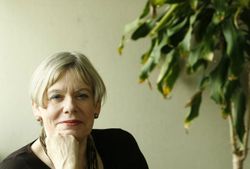From National Post:
 So what is Armstrong saying about God and religion? She argues for an approach that has more to do with the heart and spirit, approaching religious texts as allegories rather than literal truth. She argues for a religion not burdened by systems of belief that she views as man-made constructs that squeeze the joy out of faith. Religion, she believes, should be more about ritual than ideas. The height of religious experience, she insists, is to be left in a state of awe and the realization that God cannot be known.
So what is Armstrong saying about God and religion? She argues for an approach that has more to do with the heart and spirit, approaching religious texts as allegories rather than literal truth. She argues for a religion not burdened by systems of belief that she views as man-made constructs that squeeze the joy out of faith. Religion, she believes, should be more about ritual than ideas. The height of religious experience, she insists, is to be left in a state of awe and the realization that God cannot be known.
Most important, religion is about developing a high level of compassion for our fellow beings.
We became distanced from that purer form of faith, as science and religion found themselves in conflict. People, she says, forgot that reason and myth, logos and mythos, were “essential, and neither was considered superior to the other; they were not in conflict but complementary.” But during the Enlightenment, religion began to take on more of the characteristics of science, with the Church adding layers of doctrine to prove scientifically that its belief could withstand scrutiny. She points to Newton — who “hated mystery, which he equated with sheer irrationality” — as being key in the melding of science and religion, to the detriment of both. “Newton confessed from the outset he hoped to provide a scientific proof for God’s existence,” Armstrong writes. “At a stroke, Newton overturned centuries of Christian tradition. Hitherto, leading theologians had argued that the creation could tell us nothing about God; indeed, it proved to us that God was unknowable.”
More here.
So what is Armstrong saying about God and religion? She argues for an approach that has more to do with the heart and spirit, approaching religious texts as allegories rather than literal truth. She argues for a religion not burdened by systems of belief that she views as man-made constructs that squeeze the joy out of faith. Religion, she believes, should be more about ritual than ideas. The height of religious experience, she insists, is to be left in a state of awe and the realization that God cannot be known.
